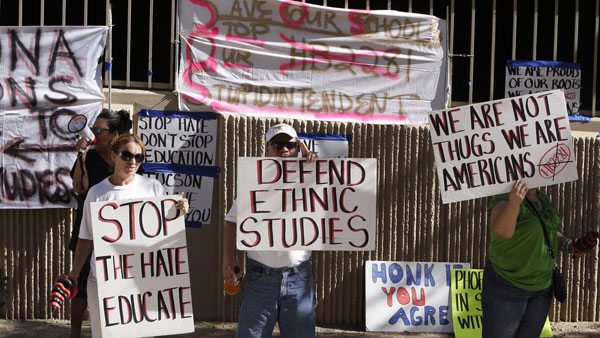
August 23, 2017; New York Times and NPR
Federal Judge A. Wallace Tashima has ruled that racial animus was in fact at the core of the decision to discontinue a Mexican-American Studies program in the Tucson, Arizona public schools. His ruling stated that the elimination of the program in 2012, based on the premise that it violated a state statute passed in 2010, infringed on students’ First and 14th Amendment rights. Judge Tashima wrote, “The court is convinced that decisions regarding the MAS program were motivated by a desire to advance a political agenda by capitalizing on race-based fears.”
The importance of this ruling and its findings smack in the face of Arizona law (HB 2281). As reported by Julie Depenbock of NPR:
Republican lawmakers were specifically targeting a Mexican-American studies program at Tucson High School—where minority enrollment is 88 percent. The Republicans who wrote the legislation, Tom Horne and John Huppenthal, claimed the classes were stoking racial tensions and “radicalizing students.” They pointed to the course materials—among them, Freire’s Pedagogy of the Oppressed and Rodolfo Acuña’s Occupied America—as well as the class decor, which included a poster of Che Guevara. In 2010, Horne and Huppenthal passed HB 2281, prohibiting classes and materials that “promote the overthrow of the U.S. government,” “resentment toward a race or class or people,” or “ethnic solidarity.”
It should be noted that the Tucson School District offered other ethnic studies programs for African American studies and Native American studies that were not impacted by this legislation. In his 42-page brief, Judge Tashima cited that the internal investigation, conducted by the Arizona Department of Education, began with the premise that the program was illegal. This investigation never observed any of the Mexican-American Studies classes or interviewed any faculty. Their conclusion that the program was illegal was based solely on the course materials.
Much of this ruling was also based on anonymous blog comments posted by former State Superintendent John Huppenthal, which included “No Spanish radio stations, no Spanish billboards, no Spanish TV stations, no Spanish newspapers. This is America, speak English,” and specific to the program, “The rejection of American values and embracement of the values of Mexico in La Raza classrooms is the rejection of success and embracement of failure.”
Sign up for our free newsletters
Subscribe to NPQ's newsletters to have our top stories delivered directly to your inbox.
By signing up, you agree to our privacy policy and terms of use, and to receive messages from NPQ and our partners.
Huppenthal, following the court ruling, denied any bias toward Mexican Americans. His view is that the program taught students a negative view of American history. “It teaches kids to hate, in my view—that whites are the oppressor and Hispanics are the oppressed. It’s a tired cliché,” he stated.
The question of the impact and efficacy of ethnic studies was not the issue in this statute or in this particular court ruling. Such programs of study have, it seems, a proven track record and are being widely embraced in school districts across the country.
Ethnic studies has “gained momentum, frankly, with the election of Donald Trump,” says Ravi Perry, president of the National Association for Ethnic Studies. This summer, Oregon set a timetable for the adoption of K-12 ethnic studies standards. Efforts to introduce statewide legislation are also ongoing in Kansas and starting this year, Indiana high schools will be required to offer ethnic and racial studies as an elective course. States with large indigenous populations—like Montana and Alaska—have already written standards for culturally responsive teaching. “We have an obligation to ensure their heritage is aptly reflected in how we talk about America,” Perry says. “This is not about promoting an individual agenda. It’s about understanding the importance of community solidarity.”
Teachers in these programs view them as a means of guiding students of color toward a better life and higher achievement. Artnelson Concordia, a teacher who is developing the San Francisco curriculum, told NPR, “Ethnic studies works.” Concordia wants students to see that “all of their experiences can be connected to larger issues. So, by the end of the school year, they’re seeing themselves as makers of history.”
In Tucson, the current superintendent was named in the lawsuit, Gonzalez v. Douglas, although the suit began before her tenure. Her office indicated that they intend to abide by whatever ruling is issued by the federal court. The ruling was applauded by UNIDOS, a coalition of Tucson students and alums that was initiated when the ban took effect. Their statement said, “As a community we celebrate this victory with all those who have supported and pursued the dismantling of this racist act against the Mexican-American community.” A reinstatement of the Mexican-American Studies program in Tucson could be on the horizon.—Carole Levine













